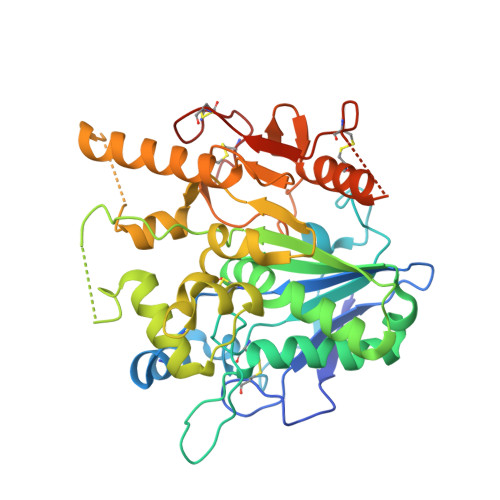Design of a Potent, Selective, and Brain-Penetrant Inhibitor of Wnt-Deactivating Enzyme Notum by Optimization of a Crystallographic Fragment Hit.
Willis, N.J., Mahy, W., Sipthorp, J., Zhao, Y., Woodward, H.L., Atkinson, B.N., Bayle, E.D., Svensson, F., Frew, S., Jeganathan, F., Monaghan, A., Benvegnu, S., Jolly, S., Vecchia, L., Ruza, R.R., Kjaer, S., Howell, S., Snijders, A.P., Bictash, M., Salinas, P.C., Vincent, J.P., Jones, E.Y., Whiting, P., Fish, P.V.(2022) J Med Chem 65: 7212-7230
- PubMed: 35536179
- DOI: https://doi.org/10.1021/acs.jmedchem.2c00162
- Primary Citation of Related Structures:
7PJR, 7PK3, 7PKV - PubMed Abstract:
Notum is a carboxylesterase that suppresses Wnt signaling through deacylation of an essential palmitoleate group on Wnt proteins. There is a growing understanding of the role Notum plays in human diseases such as colorectal cancer and Alzheimer's disease, supporting the need to discover improved inhibitors, especially for use in models of neurodegeneration. Here, we have described the discovery and profile of 8l (ARUK3001185) as a potent, selective, and brain-penetrant inhibitor of Notum activity suitable for oral dosing in rodent models of disease. Crystallographic fragment screening of the Diamond-SGC Poised Library for binding to Notum, supported by a biochemical enzyme assay to rank inhibition activity, identified 6a and 6b as a pair of outstanding hits. Fragment development of 6 delivered 8l that restored Wnt signaling in the presence of Notum in a cell-based reporter assay. Assessment in pharmacology screens showed 8l to be selective against serine hydrolases, kinases, and drug targets.
Organizational Affiliation:
Alzheimer's Research UK UCL Drug Discovery Institute, University College London, Cruciform Building, Gower Street, London WC1E 6BT, U.K.


















